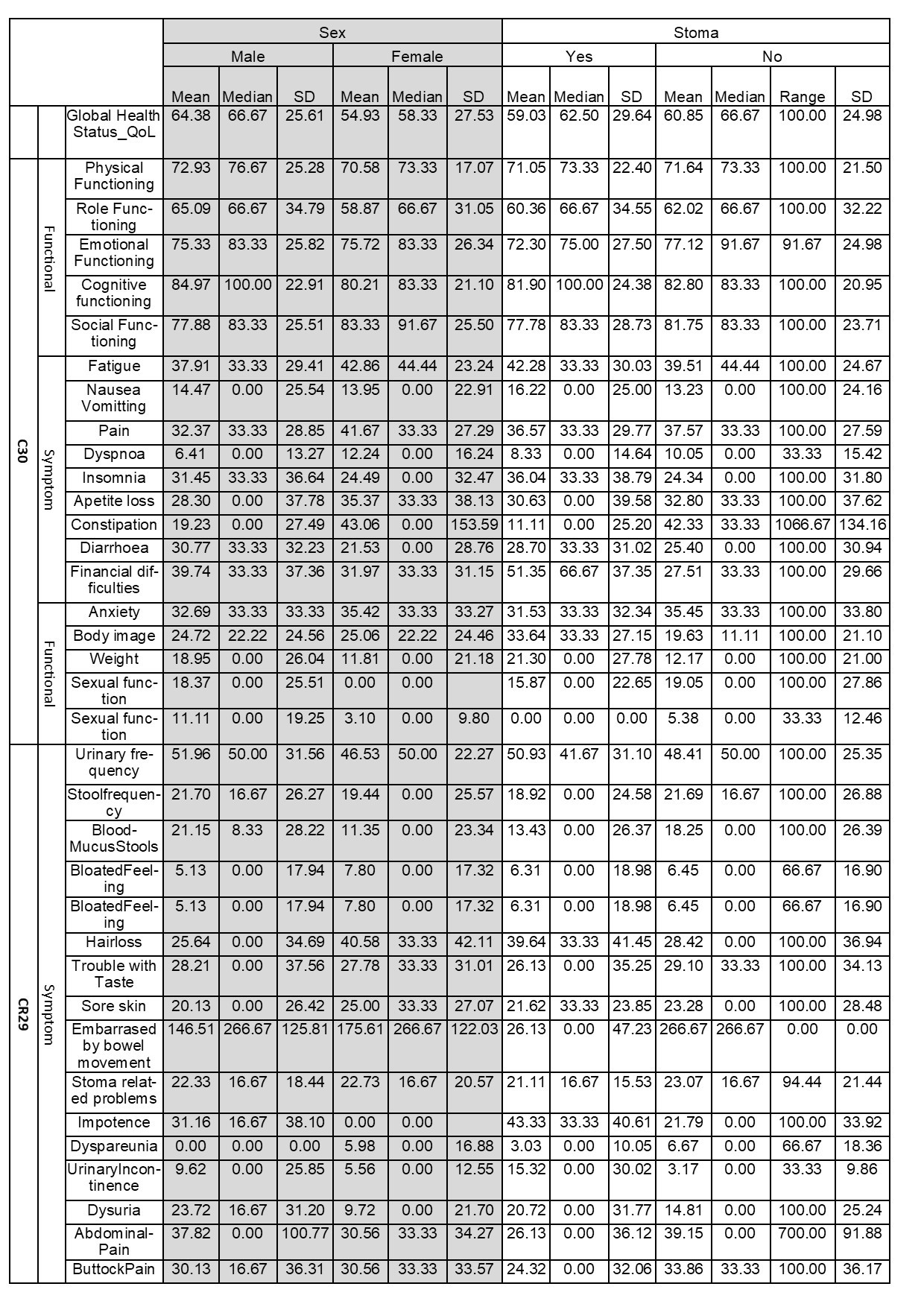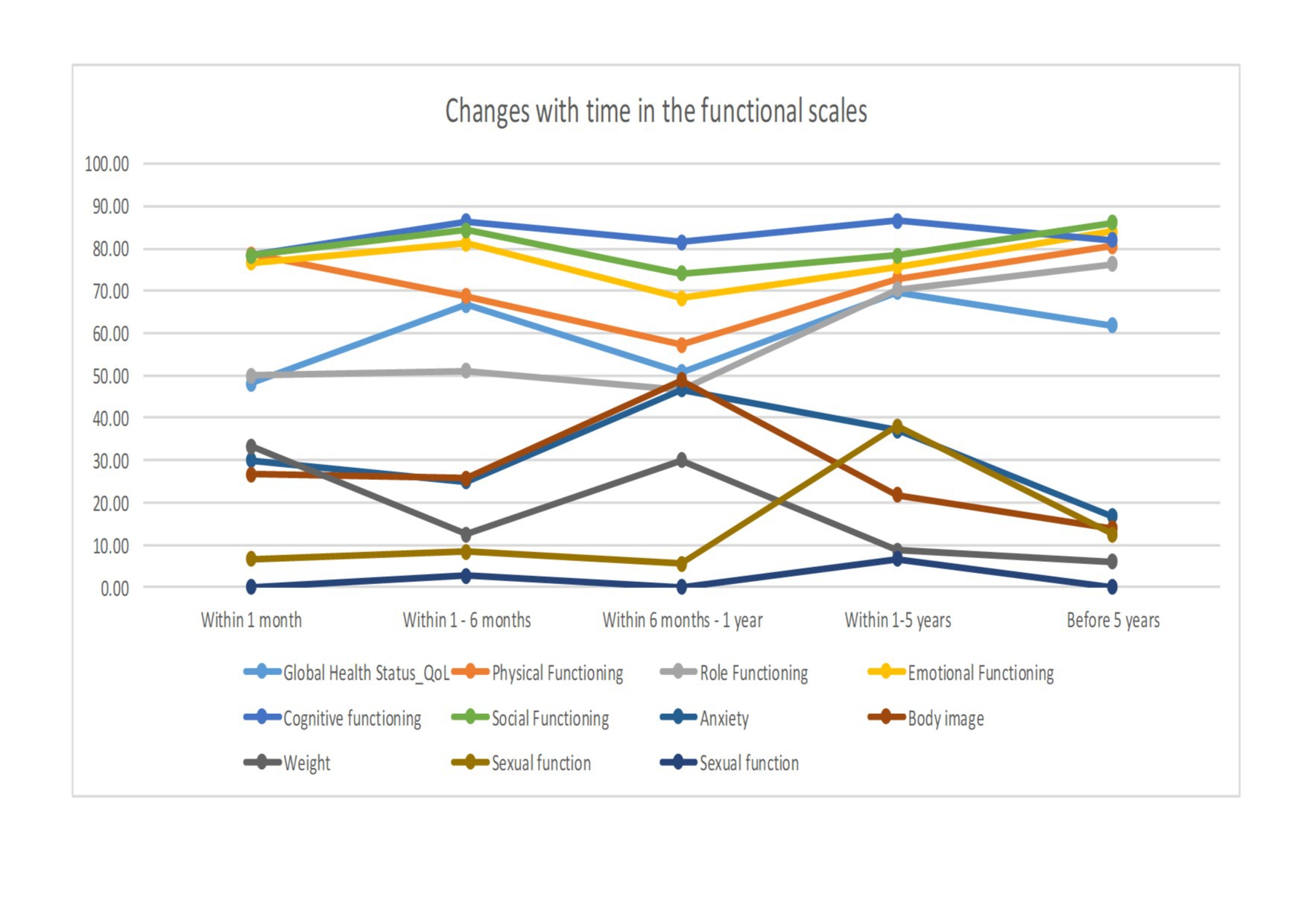
|
QUALITY OF LIFE IN PATIENTS TREATED FOR COLORECTAL CANCER IN SRI LANKA Dakshitha Wickramasinghe*, Praveen V. Dayasena, Pragathi L. Weerakkody, Sanjeewa Seneviratne, Dharmabandhu N. Samarasekera Department of Surgery, Faculty of Medicine, University of Colombo, Colombo 08, Sri Lanka Introduction The quality of life (QOL) in patients with colorectal cancer (CRC) in Sri Lanka has not been evaluated before. We present the findings of the first study on the QOL of Sri Lankan CRC patients. Methodology Colorectal cancer patients with stage I - III who underwent treatment with a curative intent at 2 referral centres in Sri Lanka were invited to participate in the study. Translated and validated Sinhala version of the European Organization for research and treatment of cancer (EORTC) QLQ-C30 and QLQ-CR29 questionnaires were administered. Mann-Whitney and Kruskal-Wallis tests (KWT) were used to identify statistically significant differences in the QOL among subgroups. Spearman correlation coefficient was used to identify correlations. Results A total of 102 participants (Male: Female 53: 49) were recruited. Their mean age was 57.2 years (SD- 12.0). Twenty-five of them (24.5%) were undergoing neo-adjuvant treatment while the remaining had had surgery at different times. The majority (N=79, 77.5%) were treated for rectal cancer. Patients who had had an abdominoperineal resection (APR) had a higher score for financial difficulty scale than patients who had anterior resection (AR) or colectomy (KWT, χ2(2)=7.9, p=.02). The scores of patients who underwent AR and colectomies were similar for most scales. Of patients diagnosed with rectal cancer, patients who received radiotherapy had higher scores for symptom scales and lower scores for functional scales. However, none of the differences reached statistical significance. Similarly, there was no statistically significant difference in the functional and symptoms scores whether they received neoadjuvant, adjuvant or combined regimes. The time since surgery had a statistically significant effect on the QOL of the patients. Patients who were 6-12 months after surgery had the highest score for body image (KWT, χ2(4)=10.0, p=.04) and fatigue (KWT, χ2(4)=10.2, p=.038), and the lowest scores for physical functioning (KWT, χ2(4)=10/4, p=.034), role functioning (KWT, χ2(4)=10.9, p=.027), Fatigue (KWT, χ2(4)=14.6, p=.006), dyspnoea (KWT, χ2(4)=9.9, p=.042) and financial difficulty (KWT, χ2(4)=14.2, p=.007). There were no statistically significant differences in the QOL scales between patients who underwent open or laparoscopic surgery. Patients with cancer of the rectum with a stoma had significantly higher scores for Body image scale (U=456, p=.022), Urinary incontinence (U=556.5, p=.009) and Hair loss (U=513, p=.033) and financial difficulty (U=458, p=.004). The patients without a stoma had significantly higher scores for constipation (U=431, p=.001). Conclusions The QOL of patients with CRC in Sri Lanka have been described. Several significant associations and trends have been identified. 
Back to 2018 Posters |
|||||||||||||||
© 2026 Society for Surgery of the Alimentary Tract. All Rights Reserved. Read the Privacy Policy.
